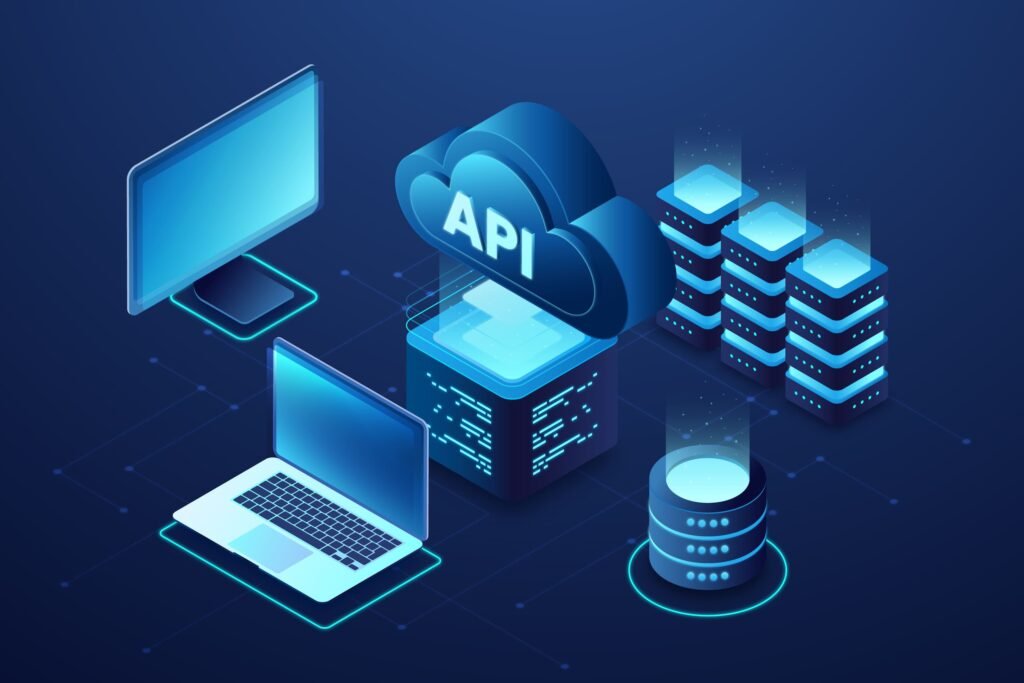Why Is Api Security Important?
In the busy world of online chatting and sharing, APIs (short for Application Programming Interfaces) are the behind-the-scenes stars. They help different computer programs and gadgets work together smoothly. Imagine APIs like friendly messengers, making sure your favorite apps, websites, and devices can chat in the language they all get. But, here’s the twist: because these messengers carry important data, they’re often targeted by online attackers. That’s why keeping APIs secure isn’t just a good idea, it’s necessary to protect the private and important information being shared.
Keeping APIs secure is very important for you, and it’s not just about keeping our data secure. It’s about making sure the whole online world we trust stays secure. As companies and their services link up more and more, the chances of someone sneaking in and stealing data go up too. If one API gets hit by hackers, it’s like knocking over the first domino it can put a whole bunch of connected services at risk. So, making sure APIs are secure is like making the base of a building super strong. It helps everything built on top stay secure and keep working well, even when there are online threats around.
What is API Security?
API Security is all about the steps and rules we set up to keep the data secure when it’s sent back and forth through APIs (short for Application Programming Interfaces). In the online world, think of APIs as bridges that let different computer programs talk to each other, share stuff, and do more together smoothly. Because they play such a big role in linking everything up, APIs are like the doors in your house that let you move around very useful, but they could let in unwanted guests if they’re not locked up tight.
At its heart, keeping APIs secure means ensuring only the right people can access these digital doors. This means stopping anyone who shouldn’t see or change the data from getting in. To do this, we use tricks like secret codes (encryption), special keys (token-based authentication), and regular check-ups (security audits) to make sure everything’s as secure as it should be. In short, API security keeps the lines of communication open and trustworthy, ensuring the exchange of information stays smooth and secure amidst all the different ways we interact online today.
Why API Security Should Be a Top Priority?
In today’s world, where data is super valuable, keeping APIs (short for Application Programming Interfaces) secure should be at the top of the to-do list for every company. There are two big reasons for this: first, APIs deal with a ton of data, and second, the data they handle is often very private and important. This could be anything from a user’s info to key business secrets. If this kind of data got into the wrong hands because of a problem with an API, the effects could be huge. It’s not just about losing money right away, but also about the lasting harm to how much people trust and think of a company.
What’s more, since everything online is so connected, a problem with one API can trigger a chain reaction, putting many systems and networks at risk. This linked-up nature means a single weak spot can lead to big problems, making it super important to keep APIs secure from hackers and other dangers. In times when online threats are getting smarter and non-stop, protecting APIs isn’t just about keeping data secure; it’s about defending the core of our online world. So, making sure APIs are secure is more than just a technical issue; it’s a crucial move to keep everything running smoothly, protect private information, and build trust with people in a world that’s more connected every day.
Innovative Strategies to Mitigate API Risks

To lower the risks with APIs, we need a mix of smart ideas, the latest technology, and a mindset always on the lookout for security. Here are some key ways to make APIs stronger against possible dangers:
- Robust Authentication and Authorization: Make sure only the right people can get into APIs. Use something like OAuth, which lets users in without sharing their passwords, and add another check step, like a code sent to their phone, for extra security.
- Encryption and Secure Data Transmission: Always scramble data when sending it over the internet with something like TLS (Transport Layer Security). This way, even if someone grabs the data, they can’t understand it.
- API Gateways: Think of API gateways as a security guard for APIs. They’re the main door for API traffic, checking everything and adding a protective layer between the outside world and the inner workings of the system.
- Rate Limiting and Throttling: Set limits on how many times an API can be used in a certain period to stop overload and block attacks that try to overwhelm the system.
- Regular Security Audits and Vulnerability Testing: Always be on the lookout for security risks by testing and checking the APIs. Use automated tools to find problems and make regular checks to stay up to date with security rules.
- API Security Tools and Platforms: There are special tools just for API security that can help spot dangers, watch for unusual behavior, and block threats as they happen.
Using these methods does more than just protect APIs from dangers; it builds a strong and secure setup that can handle the ever-changing threats in the online world. By always using the latest security tricks, companies can keep their online stuff secure and keep their users’ trust.
Emerging API Vulnerabilities and How to Prevent Them
As the online world grows and changes, so do the weak spots in it. This means companies need to be always alert and ready to change their strategies. Here are some new problems with APIs and ways to stop them:
- Broken Object Level Authorization (BOLA): BOLA happens when people can see or change things they shouldn’t in an app by messing with the object ID in an API call. To stop this, make sure each request checks if the user has the right to access that information.
- Broken User Authentication: This problem pops up when attackers find ways around login systems to pretend they’re real users. Making logins stronger with things like special tokens, tough password rules, and extra steps like codes sent to your phone can help keep things tight.
- Excessive Data Exposure: Sometimes, APIs give away more data than they should. To avoid this, APIs should only share what’s needed for the app to work, nothing more.
- Lack of Resources & Rate Limiting: If there’s no cap on how many times an API can be used, it could be knocked out by too many requests. Setting limits on how often an API can be used can prevent this kind of trouble.
- Security Misconfiguration: This is a catch-all for all sorts of misconfiguration, like not fixing known bugs, leaving files unprotected, or running extra services that aren’t needed. Keeping everything up-to-date and running regular security checks can help dodge these issues.
- Injection Flaws: This happens when unsafe data gets mixed into commands or queries, leading to trouble. Making sure only safe, checked input gets through and using special ways to set up commands can keep things secure.
- Improper Assets Management: If old or unused APIs are still hanging around, they might be easy targets for attackers. Keeping a close eye on all the APIs you’ve got and shutting down the ones you don’t need anymore is a smart move.
By getting to know these weak spots and taking steps to prevent them, companies can beef up their API security. It’s all about building a mindset of staying secure that grows and changes just like the threats do, making sure our online paths stay secure, dependable, and worthy of trust.
The Evolution of Cybersecurity Norms: Integrating API Safety
The world of cybersecurity is always changing, and making APIs secure is a big change in how groups protect their online spaces. This change isn’t just about using new gadgets or rules; it’s about changing the whole idea of cybersecurity to meet the special challenges that APIs bring.
In the past, cybersecurity was mostly about building strong walls around everything and keeping the attackers out. But, as different online parts started connecting more through APIs, those walls got bigger and the lines between what’s inside and outside got fuzzy. This change made people think differently, seeing API security as a key part of keeping everything secure online, not just an extra thing to think about later.
This transformation is evident in several key developments:
- API-First Security Design: Nowadays, groups are putting security first when they create APIs. This means they start with security in mind, setting clear security goals and adding protective steps all through the API’s life from making it to using it and keeping it up.
- Adoption of API Security Standards and Frameworks: There’s also a push to follow certain security rules and guides, like the ones from OWASP for API security. These guides help spot common weak spots in APIs and tell how to protect against them. More and more, these guidelines are becoming part of official rules and checks.
- Enhanced Collaboration Across Teams: Bringing different teams together like the folks who make the apps, the security experts, and the ones who keep everything running has become key. This teamwork, often called DevSecOps, means everyone shares the job of keeping things secure, right from the start.
- Leveraging Artificial Intelligence and Machine Learning: As APIs get more complex and there’s just too much going on for people to keep an eye on everything, AI and machine learning are stepping in. They help spot when something’s not right, guess where threats might come from, and react fast to keep things secure.
- Increased Public and Regulatory Scrutiny: With a lot of big data leaks happening because of API issues, both the public and the people in charge are paying more attention to API security. This has led to tougher rules and a demand for clear info on how APIs are kept secure.
The way we think about cybersecurity is changing to include API security because we now understand how important APIs are in our digital world. This shift is about being ahead of the game and looking at the big picture to keep everything secure in our connected online environment. As we move forward, keeping APIs secure will become a basic part of online security, making sure our digital dealings are secure and reliable.
Best Practices for Ensuring API Security
Keeping APIs secure involves many steps and needs careful planning, looking ahead, and sticking to best practices. Here are some key actions companies can take to strengthen their API protection:
- Implement Strong Authentication and Authorization: Use thorough verification to ensure users are who they claim to be, like OAuth and OpenID Connect. This makes sure everyone has the right access.
- Utilize Encryption: Keep data secure while it’s moving by using TLS encryption, so no one can sneak a peek or mess with the data.
- Adopt API Gateways: Use API gateways to look after, keep an eye on, and protect your API traffic. They help enforce security rules, manage how many requests come in, and protect against threats.
- Embrace Throttling and Rate Limiting: Control how often someone can use your API to stop misuse and prevent overload attacks. Choose limits that make sense for your app and how people use it.
- Regular Security Auditing and Penetration Testing: Regularly check your security and do tests to find weak spots. Stay alert for new threats and update your security steps as needed.
- Input Validation and Sanitization: Check all data coming in to stop harmful attacks. Make sure only the right kind of data gets through to your APIs.
- Error Handling and Logging: Be smart about handling mistakes to avoid giving away too much information. Keep detailed records for checking and solving problems, but don’t include private details.
- Security Headers and Policies: Use special web security settings like CSP and X-Content-Type-Options to give your APIs and their users an extra security layer.
- API Versioning: Keep different versions of your APIs to add new stuff or improve security without causing problems. This keeps things running smoothly.
- Educate and Train Your Team: Teach your team about security. Regular training for everyone involved is key to making sure they all know how important API security is and how to do it right.
By adding these top tips to how you create and look after your APIs, you can make them a lot safer. Taking these smart steps not only keeps your data and services secure but also makes your users trust you more, leading to a safer and more dependable online space.
In conclusion
In conclusion, keeping APIs secure is very important for protecting our online world. Since APIs let data flow smoothly between apps and services, they need strong protection against constantly changing online threats. Using the best security steps, like tough login checks and regular security checks, is not just about tech stuff it’s a must-do strategy. Keeping APIs secure is an ongoing task that needs non-stop attention, new ideas, and a strong focus on security in all organizations. By making API security a top priority, we’re not just looking after our data and services; we’re also making sure that people can trust the online systems they use, leading to a safer and stronger digital world for everyone.
FAQs
What makes API security a critical concern for businesses today?
API security is the armor that protects the sensitive data exchanged between systems, applications, and users. In today’s interconnected digital landscape, ensuring this data remains inaccessible to unauthorized parties is essential for maintaining trust and operational integrity.
How can weak API security impact consumers?
Insufficient API security can lead to data breaches, compromising personal information like addresses, credit card details, and more. This not only infringes on privacy but also exposes consumers to potential financial fraud and identity theft.
Can API security affect the performance of applications?
Indeed, robust API security measures like encryption and throttling can influence the response times of applications. However, these are necessary trade-offs to prevent malicious activities and ensure a secure user experience.
In what ways does API security contribute to regulatory compliance?
Many regulations mandate strict data protection and privacy measures. By fortifying API security, organizations can comply with these legal requirements, avoiding hefty fines and reputational damage.
What are the repercussions of neglecting API security for startups?
Startups often focused on growth and innovation, might overlook API security, exposing them to cyber-attacks. This can derail their progress by causing data loss, eroding user trust, and incurring unforeseen recovery costs.







